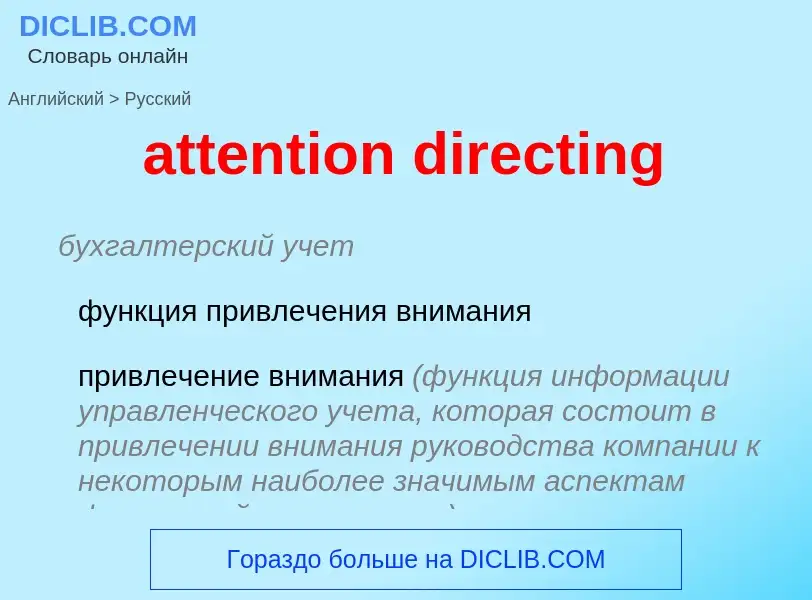Translation and analysis of words by ChatGPT artificial intelligence
On this page you can get a detailed analysis of a word or phrase, produced by the best artificial intelligence technology to date:
- how the word is used
- frequency of use
- it is used more often in oral or written speech
- word translation options
- usage examples (several phrases with translation)
- etymology
attention directing - translation to English
бухгалтерский учет
функция привлечения внимания
привлечение внимания (функция информации управленческого учета, которая состоит в привлечении внимания руководства компании к некоторым наиболее значимым аспектам финансовой отчетности)
синоним
[haipəræk'tiviti]
общая лексика
повышенная активность
гиперфункция
медицина
гиперактивность
повышенная деятельность (больного)
существительное
физиология
сверхактивность
общая лексика
гиперкинез
Definition
Wikipedia

Attention economics is an approach to the management of information that treats human attention as a scarce commodity and applies economic theory to solve various information management problems. According to Matthew Crawford, "Attention is a resource—a person has only so much of it."
In this perspective, Thomas H. Davenport and John C. Beck define the concept of attention:
Attention is focused mental engagement on a particular item of information. Items come into our awareness, we attend to a particular item, and then we decide whether to act.
As content has grown increasingly abundant and immediately available, attention becomes the limiting factor in the consumption of information. A strong trigger of this effect is that it limits the mental capability of humans and the receptiveness of information is also limited. Attention allows information to be filtered such that the most important information can be extracted from the environment while irrelevant details can be left out.
Software applications either explicitly or implicitly take attention economy into consideration in their user interface design based on the realization that if it takes the user too long to locate something, they will find it through another application. This is done, for instance, by creating filters to make sure viewers are presented with information that is most relevant, of interest, and personalized based on past web search history.


![in Japan]], involuntarily occupy the attention of those who hear them, an example of [[attention theft]]. in Japan]], involuntarily occupy the attention of those who hear them, an example of [[attention theft]].](https://commons.wikimedia.org/wiki/Special:FilePath/Nissan Caravan sound truck of JCP in Okazaki, Aichi 20090520.jpg?width=200)




